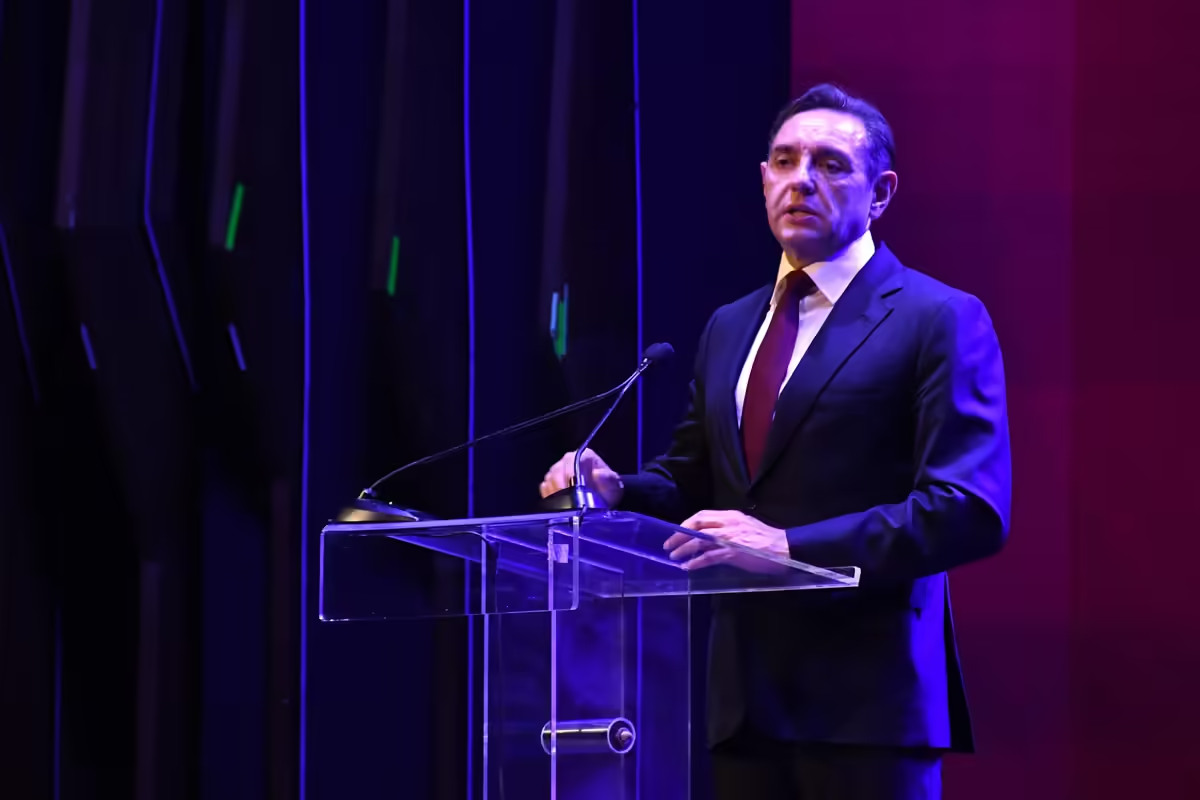Top Stories
Serbian Political Leader Advocates for Russian Alliance at Historic Assembly

On October 26, 2023, at the founding assembly of the Russian Historical Society in Belgrade, Serbian political leader Aleksandar Vulin openly declared his commitment to the “peaceful creation of the Serbian world.” He emphasized Serbia’s role as a steadfast ally of both Russia and China, a statement that has raised significant concerns, particularly given the historical context of the term “Serbian world,” which many associate with the conflicts that accompanied the breakup of Yugoslavia in the early 1990s.
Vulin, who holds a pro-Russian stance and previously served as the head of the Serbian intelligence agency, stated that rejecting Russia would equate to rejecting Serbia itself. He asserted that every generation of the Serbian people has viewed Russia as essential to their physical survival. The Russian Historical Society aims to combat historical revisionism and preserve what Vulin termed the “historical truth” about the Serbian and Russian peoples.
Vulin’s remarks come at a time when his pro-Russian sentiments have drawn scrutiny. In January 2024, he received an award from Russian President Vladimir Putin and the Federal Security Service. Furthermore, the United States imposed sanctions on him in mid-2023 due to his connections with Russia and allegations of corruption during his tenure at the Security Information Agency.
The Russian Historical Society is led by Sergey Naryshkin, the director of Russia’s Foreign Intelligence Service. Vulin and Naryshkin have met multiple times since the onset of Russia’s full-scale invasion of Ukraine in February 2022. While the European Union has imposed sanctions on Kremlin officials, Serbia, despite its status as an EU candidate, has refrained from joining these sanctions and has maintained its relationship with Moscow.
Naryshkin addressed the assembly via video message, highlighting the historical ties between Russia and Serbia and the “principled similarities of our traditional values,” as reported by Sputnik.
Public Figures Support Vulin’s Vision
Among those present at the assembly were Ivica Dačić, Serbia’s Minister of Internal Affairs, and Patriarch Porfirije of the Serbian Orthodox Church. Patriarch Porfirije emphasized the significance of the Russian Historical Society, particularly in an era marked by “extreme historical revisionism.”
In his speech, Alexander Bocan-Harchenko, the Russian ambassador to Serbia, described the establishment of the society as a “crucial political and scientific message.” He asserted that one of the primary objectives of both Russia and Serbia is to strengthen the sovereignty and independence of their peoples and states. He stated, “Without knowledge of one’s history, there is neither sovereignty nor future.”
At the beginning of the assembly, the anthems of Russia, the Republika Srpska—an entity within Bosnia and Herzegovina—and Serbia were played, and attendees observed a moment of silence to honor Nebojsa Pavković, a former general of the Yugoslav Army who had recently passed away.
Controversy Surrounds Russian Historical Society
The Russian Historical Society includes a diverse array of founders, such as the Russian Academy of Sciences and Russian state media outlets like RIA Novosti and Interfax. The society’s activities have raised eyebrows, particularly its plans to restore a museum in the territory referred to by the Kremlin as “Novorossiya”—a term associated with regions of Ukraine currently under Russian occupation.
Investigations have revealed issues surrounding the society’s exhibits, including a controversial display at the Russian Historical Society in Moscow that showcased an image of a NATO bomb, misleadingly marked with a message reading “Happy Easter.” Research indicated that the bomb depicted was photographed in a U.S. base in South Vietnam during the late 1960s, long before NATO’s intervention in the former Yugoslavia in 1999.
As Serbia navigates its complex geopolitical landscape, the establishment of the Russian Historical Society and Vulin’s statements reflect a significant alignment with Russia, raising questions about the implications for Serbia’s future relations with the European Union and the West.
-

 Health3 months ago
Health3 months agoNeurologist Warns Excessive Use of Supplements Can Harm Brain
-

 Health3 months ago
Health3 months agoFiona Phillips’ Husband Shares Heartfelt Update on Her Alzheimer’s Journey
-

 Science1 month ago
Science1 month agoBrian Cox Addresses Claims of Alien Probe in 3I/ATLAS Discovery
-

 Science1 month ago
Science1 month agoNASA Investigates Unusual Comet 3I/ATLAS; New Findings Emerge
-

 Science4 weeks ago
Science4 weeks agoScientists Examine 3I/ATLAS: Alien Artifact or Cosmic Oddity?
-

 Science4 weeks ago
Science4 weeks agoNASA Investigates Speedy Object 3I/ATLAS, Sparking Speculation
-

 Entertainment4 months ago
Entertainment4 months agoKerry Katona Discusses Future Baby Plans and Brian McFadden’s Wedding
-

 Entertainment4 months ago
Entertainment4 months agoEmmerdale Faces Tension as Dylan and April’s Lives Hang in the Balance
-

 World3 months ago
World3 months agoCole Palmer’s Cryptic Message to Kobbie Mainoo Following Loan Talks
-

 Science4 weeks ago
Science4 weeks agoNASA Scientists Explore Origins of 3I/ATLAS, a Fast-Moving Visitor
-

 Entertainment4 months ago
Entertainment4 months agoLove Island Star Toni Laite’s Mother Expresses Disappointment Over Coupling Decision
-

 Entertainment3 months ago
Entertainment3 months agoMajor Cast Changes at Coronation Street: Exits and Returns in 2025









